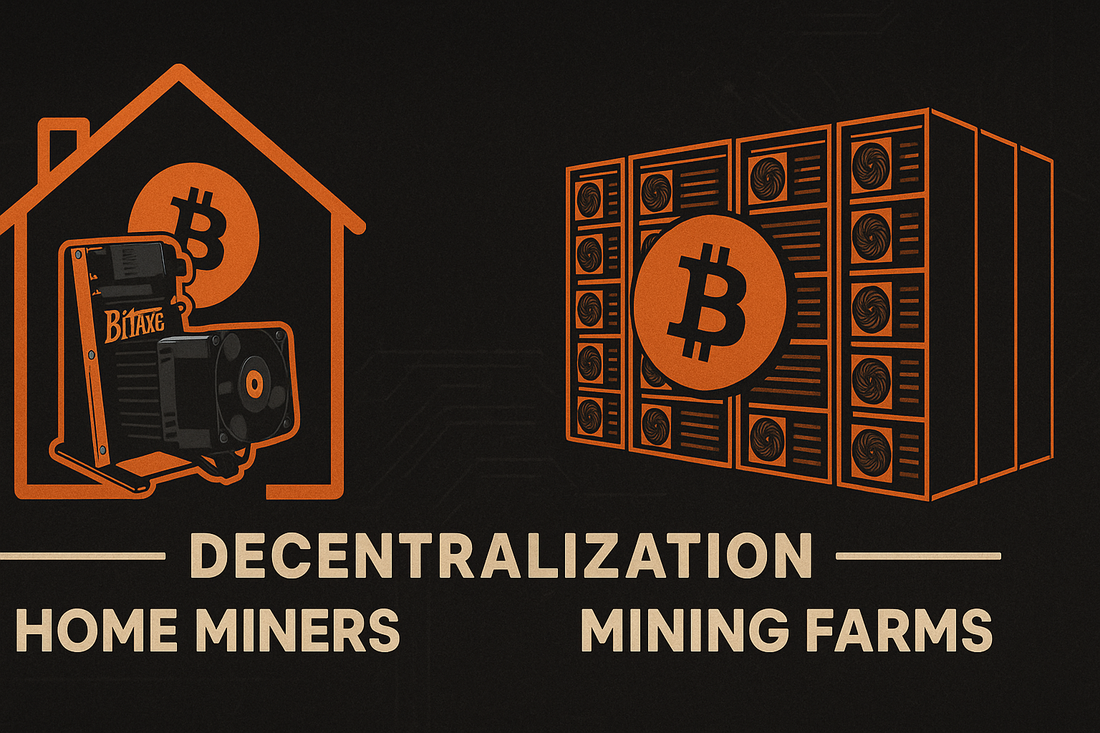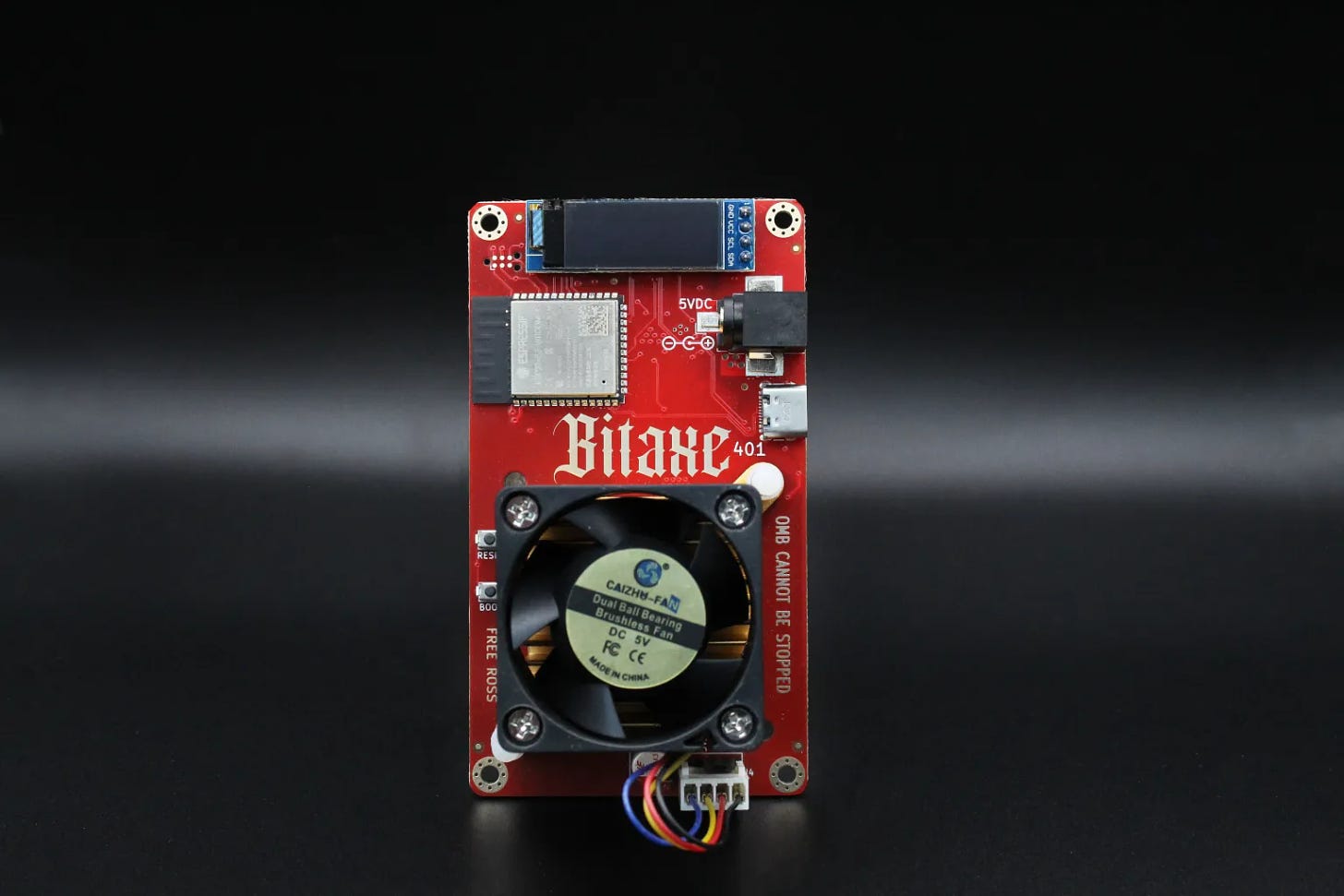
Solo Bitcoin Mining in 2025: The Rise of Home Miners and Parasite Pool
Share
Would you rather buy a lottery ticket, or run a solo Bitcoin miner that participates in a lottery every 10 minutes? Your chances of winning are better, and you actually help decentralize Bitcoin further, which means a better future for Bitcoin because it enhances security.
Sound good? Let’s read on.
The problem with Bitcoin: Decentralization and security
Why does Bitcoin work? Without getting too technical, Bitcoin works because there is no central figure controlling it. There is no central Bitcoin bank controlling the supply. The supply is programmed and fixed at 21 million. There will only ever be 21 million $BTC, and that’s that.
“That’s great, Valerioshi. So it’s decentralized. But how is it secure?” Bitcoin security is instrumental in its success, and it comes from the fact that it’s a many-headed hydra. Think of it like this:
You run 3 computers, all with the same data uploaded and synchronized. One goes down, you still got 2 more. Now imagine you’ve got thousands of machines all over the world doing the same. The more machines that are running synched data, the harder it is to corrupt that data. It's similar to a problem we call the Byzantine Generals Problem, which is about getting a majority to agree, even if some members might be malicious.
Bitcoin solves this by making every transaction public and verifiable, and by rewarding those who follow the rules and help secure the network (miners!). In other words, consensus doesn’t rely on trust: It’s enforced via incentives and computation.
So what’s the incentive to run a machine?
You can mine $BTC! And every miner costs money to purchase and to run. Until the advent of ASICs, which are machines dedicated to mining Bitcoin, you could mine $BTC using any computer, even a laptop. But as time went on and the computational difficulty of solving the hashing algorithm in mining blocks increased over time, these dedicated ASIC machines came to market. Moreover, mining pools started sprawling up.
These cost-prohibitive machines have actually led to gross accumulation by industrial facilities, and their mining pools have done a gross disservice to Bitcoin by encouraging centralization over time.

In other words, a handful of industry giants control the majority of Bitcoin’s hash power. This threatens the security of Bitcoin, and thus, Bitcoin itself.
Let’s look at some numbers:
-
Foundry USA Pool is responsible for approximately 31% of the total network hashrate.
-
Antpool mines roughly 18% of Bitcoin blocks.
Just these two largest mining pools combined take roughly half of all Bitcoin blocks.
Why is this a problem?
For 2 reasons:
-
The pool operator builds the block template, meaning that they decide which transactions go in, in what order, and when the block is submitted. This centralizes an important layer of control in a few hands.
-
But the more serious of the 2 reasons concerns security. These industrial mining monoliths have special deals with electricity companies for discounted rates. Such deals incentivize miners to opt into these facilities and pools, thereby increasing concentration.
If a major grid goes down, or if governments force these large mining farms offline, huge chunks of Bitcoin’s security can disappear overnight. And just the 2 largest pools going down would jeopardize half the hashpower of Bitcoin. Decentralization matters.
Enter Solo mining

Bitcoin was never meant to be in the hands of just a few key players. Solo mining changes that. An organization called OPMU (Open Source Miners United) helped popularize the modern solo mining movement through education and community support. You can read more about them and their mission here.
Thanks to them, we have solo miners, which are completely open source. If you believe in the mission to decentralize Bitcoin and keep it transparent and permissionless, then the concept of solo mining will appeal to you.
But still, what are the personal incentives?
You know that saying, buying lottery tickets is a tax on stupidity? That doesn’t apply in this case. This is more like you’re buying a lottery ticket for a few bucks a month. (Running a BitAxe Gamma 601 draws a bit more power than running an LED lightbulb all day.) But the difference is that your lottery ticket runs in the lotto every 10 minutes (the time it takes to solve a Bitcoin block, on average).
And solo miners have mined blocks before, so there’s that. Your chances of winning are apparently 1 in 40 million with a BitAxe Gamma 601 (higher if you use more than one or use a higher-powered miner, like the NerdQAxe++ miner).
Moreover, solo mining pools like Parasite Pool change the game entirely. Let’s take a look.
Parasite Pool: Incentives for solo miners

Parasite Pool is the brainchild of zk-🦈, the creator and leader of Ordinal Maxi Biz (OMB), one of the most highly valued ordinal art collections on Bitcoin. (Article on OMB coming soon.)
Parasite Pool works differently from other mining pools. Unlike the main pools you can join that are operated by these industry behemoths, Parasite Pool does NOT charge you a fee, and it has no threshold for a minimum payout. This means that you can join for free, and even if you earn very little (say 0.001 $BTC), you’ll still get it paid out, no problem.
The reward scheme is also different. The miner that solves the block gets 1 $BTC from the total reward of 3.125 $BTC + mining fees. The remainder of the reward is distributed to the other miners in the pool based on the hashpower they’ve contributed. This means that you have a very real chance of winning $BTC. And if you want more of that piece of the pie, just increase your hashpower by adding more miners!
The number of days to find a block for the pool is decreasing, as increasingly more solo miners join the pool.
Will you join?
If you believe in Bitcoin’s future, running your own solo miner is one of the most powerful things you can do. You can grab a miner here and start contributing today.
Interested in joining Parasite Pool? Check out zk’s substack here.
The more home miners there are, the harder it is for Bitcoin to be controlled. And we can lead the charge.
NOTE: Any mistakes in this article are my own (Valerioshi).
